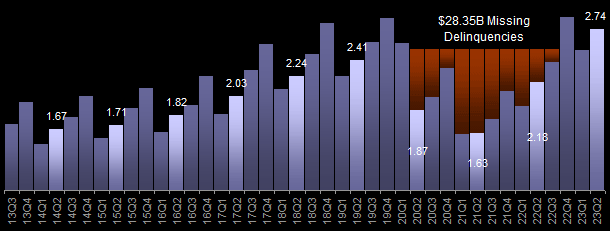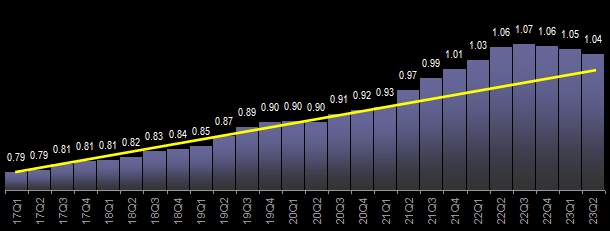Another Fall Friday, the season that brings things like State Fair food. Also, some of the must read items for the community banking pro staying in the know.
- First a look at trends in consumer debt, and maybe where the legacy of 2020-2021 is still at play
- NYSE owner Intercontinental Exchange makes a run at the mortgage industry
- Aside from the salacious, an interesting software relate snippet from the Sam Bankman-Fried /FTX trial this week.
1. The artificial consumer
Bill Moreland at BankRegData.com writes on the delayed negative impact on banks from consumer debt because of suspended rent, mortgage and student loan.
I believe much of the marginal lending to Individuals in 2021/22 was done on the back of artificially inflated credit scores.
Every month large numbers of consumers have their credit score negatively impacted by missing Rent, Mortgage and Student loan payments. By suspending those payments we also removed any associated negative scoring events.
Moreland then goes through auto and charge card delinquencies and charge offs to find the
The next chart attempts to put a figure to what the missing delinquency amount during 2020-22 was by using the 2.53% average delinquency rate for the 8 quarters from 2018 Q2 through 2020 Q1….Naturally, we’ll never know the true figures, but it’s not unrealistic to think that between $25-30 Billion worth of auto delinquencies never hit the credit bureaus.

Moreland presents a well thought out analysis to make his case that the consumer ledger should be a bigger concern than even commercial real estate.
2. The rollup of mortgage origination
Intercontinental Exchange (ICE - NYSE) has been wrapping up the mortgage origination tolls market, most recently with its $11B acquisition of Black Knight software last month.
When you meet a lender to get a mortgage, the loan officer is often using software from Ellie Mae, which ICE bought for around $11 billion in 2020. When you close the mortgage, it is typically registered in a giant database called Mortgage Electronic Registration Systems, or MERS, which ICE acquired in stages between 2016 and 2018. Your mortgage might also be recorded with the county government using a business called Simplifile. ICE bought it in 2019.
Black Knight is the final major piece of the puzzle for ICE. If your lender sells the servicing rights to your mortgage, the servicer is the company that collects your payments and takes your phone calls if you have a problem. Black Knight controls nearly two-thirds of the market for mortgage-servicing software. That company, too, is now part of ICE.
Naturally, there has been a lot concern about the concentration of pricing power, especially from trade groups including The Community Home Lenders of America, even using the triggering term “junk fees”:
In a letter to regulators in August, the group said ICE charged lenders “junk fees” to access basic data about a customer’s mortgage. It also said ICE refused to reduce fees when many lenders laid off employees in 2022, even though the fees were based on the number of users at each firm, and ICE had increased the fees when the housing market was strong and lenders were hiring. The result was “heads ICE wins, tails they don’t lose,” the trade association said.
As a sidebar, the FTC required Black Knight to sell their loan origination system Empower/Optimal Blue as part of the deal with ICE. It appears Canadian software conglomerate Constellation Software got a real steal in the process:
Constellation paid $240MM cash upfront (and $500MM note) combined for Empower/Optimal Blue, which the market valued at ~$3.4B as part of Black Knight.
We now estimate 28-38% levered IRR on the two acquisitions, up from 26% previously, assuming -2% to +2% organic growth per annum and 34-37% long-term adj. EBITDA margins.
Even the financing was stellar:
The $500m note mentioned above is also very interesting! It has a 40 year maturity at 7% interest and Constellation doesn’t have to make interest payments for the first 5 years.
2. Code (almost) never lies
One bit of somewhat damning evidence to come out last week from the FTX related trial of Sam Bankman-Fried was during testimony of former CTO Gary Wang. FTX prominently displayed and hyped an internal fund meant to prevent losses to users during liquidation events. This number was apparently generated using a simple random number generator:
From yesterday's exhibits in US v. Sam Bankman-Fried:
— Molly White (@molly0xFFF) October 7, 2023
The prosecution shows that the "insurance fund" that FTX bragged about was fake, and just calculated by multiplying daily trading volume by a random number around 7500 pic.twitter.com/EDiVPOHODP
Bloomberg’s Matt Levin speculates that this revelation will increase the chance of SBF testifying in his own defense:
“If Bankman doesn’t testify, all the jury will have is (1) the testimony of FTX customers who are like “all our money is gone,” (2) the testimony of all of his closest friends and colleagues testifying “yeah we stole all the money because Sam told us to” and (3) screenshots of FTX computer code that is like “IF you_feel_like_it THEN steal(all.the.money).”
And that it for this Friday. Answering the important questions, how is a Cockatiel like a Horse? How’d we do? Click below to let us know:

